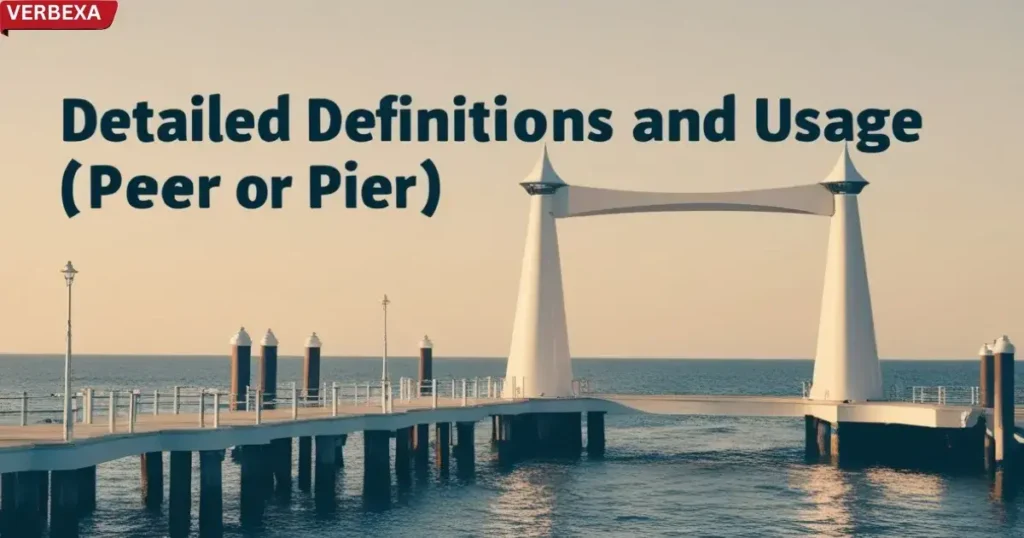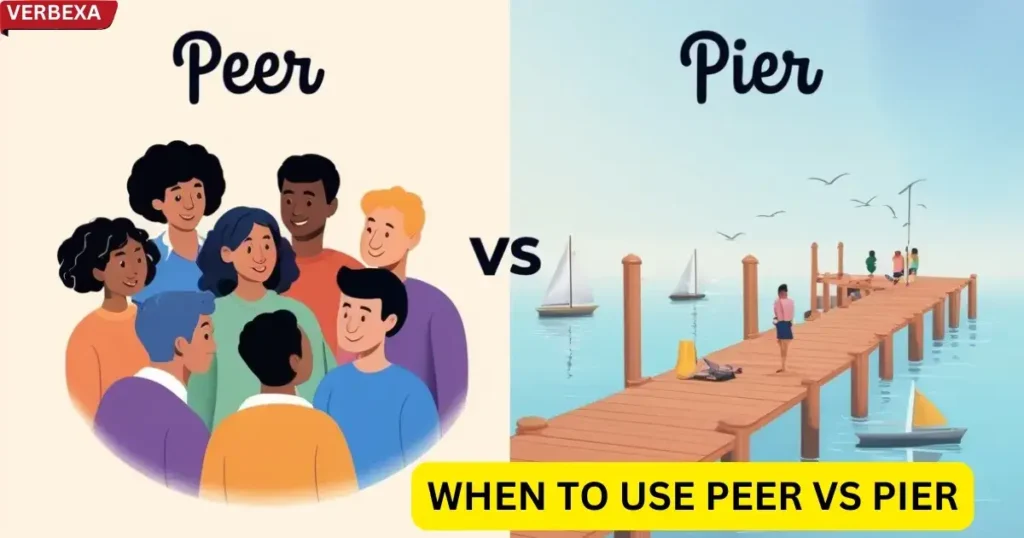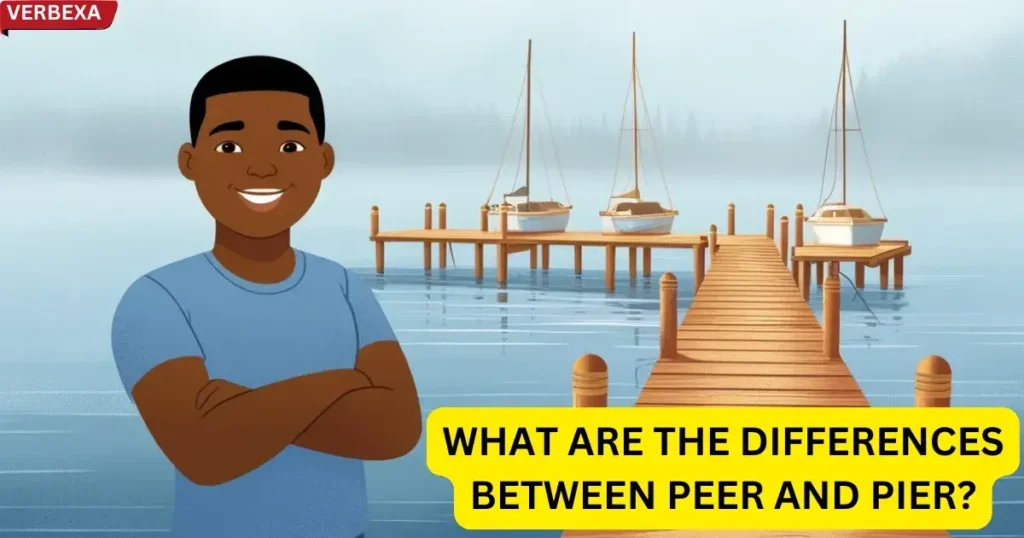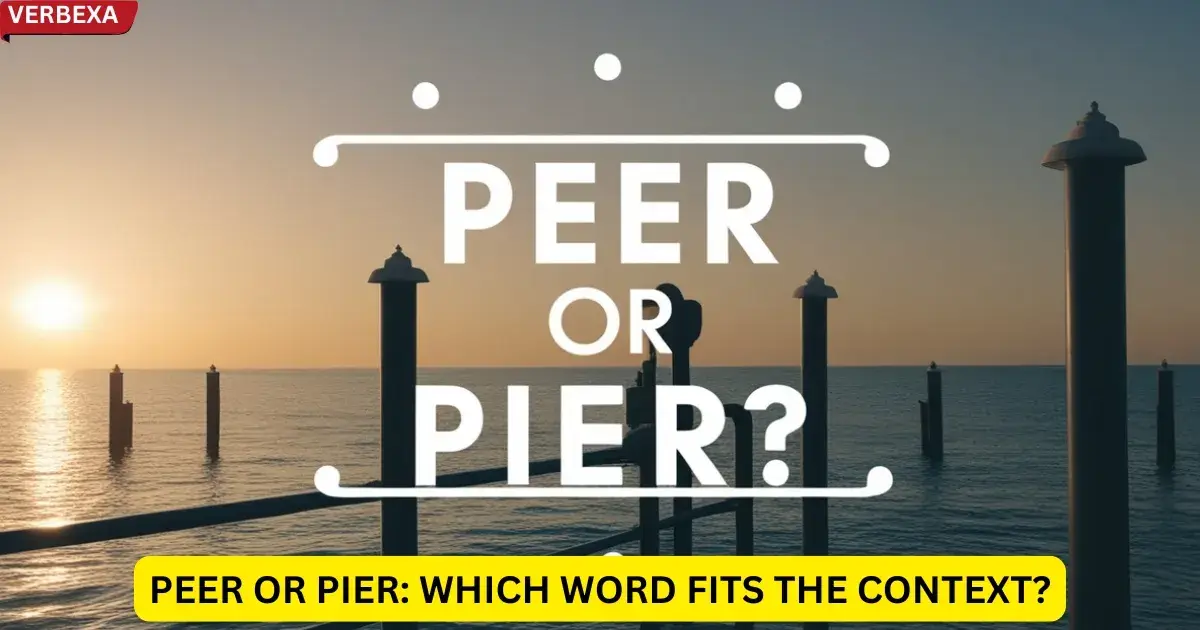When it comes to homophones in English, few pairs create as much confusion as peer vs pier. These words sound identical but serve entirely different purposes in our language. The distinction between Peer Or Pier is crucial for clear communication, whether you’re writing about social interactions or describing coastal locations.
In this article, we’ll explore the differences between peer vs pier, delve into their definitions and usage, and provide practical examples to help you understand when to use each term. Whether you’re discussing social interactions or coastal locations, knowing how to use peer and pier correctly will ensure your writing is precise and professional.
Quick Answer
- Peer: Refers to either a person of equal standing or the act of looking closely
- Pier: A structure extending into water, typically used for docking boats or recreation
Detailed Definitions and Usage

Peer: The Social Connection
As a noun, peer refers to a person who is equal in rank or status to another. It often refers to individuals within a particular group, such as colleagues, classmates, or companions. It can also describe a person who shares a similar characteristic, like age or interests.
Examples of “peer” in a sentence:
- “She was respected by her peers for her hard work and dedication.”
- “The professor invited several peers to collaborate on the new research project.”
As a verb, peer means to look closely or intently at something, often due to curiosity or difficulty in seeing clearly.
Examples of “peer” as a verb:
- “He had to peer through the foggy window to see what was happening outside.”
- “The teacher asked the students to peer at the painting closely during the art class.”
Pier: The Coastal Structure
A pier is a noun used to describe a structure that extends from the shore into the water. Piers are commonly used for docking boats, fishing, or as recreational walkways.
Examples of “pier” in a sentence:
- “The fishermen waited by the pier, hoping to catch some fish.”
- “The pier jutted out into the calm lake, offering a perfect spot for relaxation.”
A pier can also be used metaphorically to represent something that connects two places, like a bridge. However, in most cases, it is a literal structure by the water.
Comparison Table: Peer vs Pier
| Aspect | Peer | Pier |
|---|---|---|
| Definition | A person of equal standing or rank. | A structure extending into the water. |
| Grammatical Role | Noun (person) or verb (look closely) | Noun (structure) |
| Context | Social interactions, equality, group dynamics. | Coastal or lakeside structures, boating. |
| Example Sentence | “She is respected by her peers.” | “We walked along the pier at sunset.” |
| Synonyms | Equal, companion, colleague, contemporary. | Dock, quay, jetty, marina. |
| Common Confusion | People mistakenly use it to describe a structure. | People mistakenly use it to describe people. |
When to Use Peer vs Pier

Using “Peer”
Use “peer” when discussing:
- Social interactions among equals
- Situations involving peer pressure
- Academic or professional relationships
- The act of looking carefully (peering)
Example sentences:
- “She was respected by her academic peers.”
- “He had to peer through the fog to see the path.”
Using “Pier”
Use “pier” when referring to:
- Wooden pier structures
- Beachside attractions
- Marine infrastructure
- Recreational structures by water
Example sentences:
- “Tourists at the pier enjoyed watching the sunset.”
- “The boats were securely moored to the pier.”
Synonyms
Synonyms for Peer (Noun)
- Equal
- Contemporary
- Colleague
- Associate
- Counterpart
- Companion
- Match
- Fellow
- Equivalent
- Coequal
Pier Synonyms
- Dock
- Wharf
- Jetty
- Landing
- Quay
- Marina
- Boardwalk
- Harbor
- Berth
- Waterfront
Everyday Usage Examples: Peer or Pier
Peer in Context
- “The jury must be judged by peers from the community.”
- “Scientists often engage in peer review before publishing.”
- “She had to peer through the window to see inside.”
Pier in Context
- “Fishermen gathered at the pier early morning.”
- “Let’s take a walk along the pier tonight.”
- “The wooden pier creaked under their feet.”
What Are the Differences Between Peer and Pier?

Before diving deep into usage, let’s break down the two words and examine their meanings:
- Peer (noun): A person who is of equal standing or rank with another person. Peers can refer to individuals within a group who share the same characteristics, such as age, rank, or status.Example: “The students had a group project where they worked together as peers.”
- Pier (noun): A structure that extends from the shore into the water, typically used for docking boats or as a walkway. Piers are commonly found at coastal locations or lakesides and are used for various activities like fishing or taking a stroll.Example: “We enjoyed a beautiful sunset walk along the pier by the beach.”
Why Do People Get Peer and Pier Confused?
The reason these two words are often confused lies in their pronunciation. Both peer and pier sound exactly the same, making them homophones. However, their meanings and grammatical roles differ significantly, which can lead to errors in usage if you’re not careful.
Understanding the contextual usage of each word is crucial for distinguishing between them. While peer refers to people or social interactions, pier refers to a physical structure typically found by the water. Let’s look at both words in more detail to see when to use each one correctly.
Conclusion
Understanding the difference between peer vs pier is essential for effective communication. While these homophones may sound identical, their meanings and applications differ significantly. Remember that peers are people or actions involving careful observation, while a pier is always a physical structure by water. This word sense disambiguation is crucial for choosing the right term in any given context.
By keeping in mind the distinct characteristics of each word – peer for social equals or intent looking, and pier for waterfront structures – you can confidently use these terms in their proper contexts. Whether you’re describing a meeting with academic peers or a romantic sunset walk on a wooden pier, choosing the correct word will ensure your meaning is clear and accurate.

This author is a passionate linguist and grammar enthusiast, dedicated to helping individuals master the art of language. With years of experience in teaching and editing, she brings clarity and precision to every sentence. Tina’s mission is to empower writers of all levels to express themselves with confidence and excellence.

